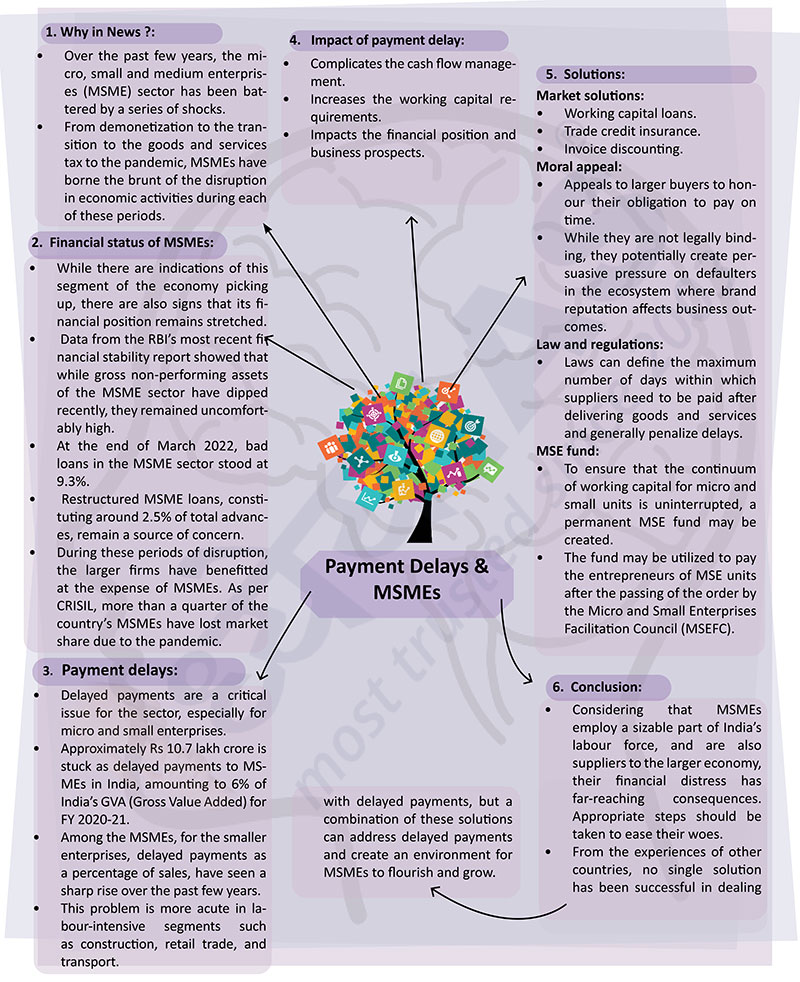Brain-booster /
24 Aug 2022
Brain Booster for UPSC & State PCS Examination (Topic: Payment Delays & MSMEs)

Why in News?
- Over the past few years, the micro, small and medium enterprises (MSME)
sector has been battered by a series of shocks.
- From demonetization to the transition to the goods and services tax to
the pandemic, MSMEs have borne the brunt of the disruption in economic
activities during each of these periods.
Financial status of MSMEs:
- While there are indications of this segment of the economy picking up,
there are also signs that its financial position ermains stretched.
- Data from the RBI’s most recent financial stability report showed that
while gross non-performing assets of the MSME sector have dipped recently,
they remained uncomfortably high.
- At the end of March 2022, bad loans in the MSME sector stood at 9.3%.
- Restructured MSME loans, constituting around 2.5% of total advances,
remain a source of concern.
- During these periods of disruption, the larger firms have benefitted at
the expense of MSMEs. As per CRISIL, more than a quarter of the country’s
MSMEs have lost market share due to the pandemic.
Payment delays:
- Delayed payments are a critical issue for the sector, especially for
micro and small enterprises.
- Approximately Rs 10.7 lakh crore is stuck as delayed payments to MSMEs
in India, amounting to 6% of India’s GVA (Gross Value Added) for FY 2020-21.
- Among the MSMEs, for the smaller enterprises, delayed payments as a
percentage of sales, have seen a sharp rise over the past few years.
- This problem is more acute in labour- intensive segments such as
construction, retail trade, and transport.
Impact of payment delay:
- Complicates the cash flow management.
- Increases the working capital requirements.
- Impacts the financial position and business prospects.
Solutions:
Market solutions:
- Working capital loans.
- Trade credit insurance.
- Invoice discounting.
Moral appeal:
- Appeals to larger buyers to honour their obligation to pay on time.
- While they are not legally binding, they potentially create persuasive
pressure on defaulters in the ecosystem where brand reputation affects
business outcomes.
Law and regulations:
- Laws can define the maximum number of days within which suppliers need
to be paid after delivering goods and services and generally penalize dealys.
MSE fund:
- To ensure that the continuum of working capital for micro and small
units is uninterrupted, a permanent MSE fund may be created.
- The fund may be utilized to pay the entrepreneurs of MSE units after the
passing of the order by the Micro and Small Enterprises Facilitation Council
(MSEFC).
Conclusion:
- Considering that MSMEs employ a sizable part of India’s labour force,
and are also suppliers to the larger economy, their financial distress has
far-reaching consequences. Appropriate steps should be taken to ease their
woes.
- From the experiences of other countries, no single solution has been
successful in dealing with delayed payments, but a combination of these
solutions can address delayed payments and create an environment for MSMEs
to flourish and grow.








